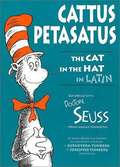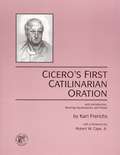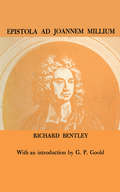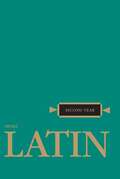- Table View
- List View
Cattus Petasatus: The Cat in the Hat in Latin
by Jennifer Morrish Tunberg Terence Tunberg SeussIncludes a Latin-English glossary and a note on the verse form and rhythm.
Cicero's First Catilinarian Oration with Introduction, Running Vocabularies, and Notes
by Karl Frerichs Marcus Tullius Cicero Laurie Haight KeenanCicero's First Catilinarian speech is now available in a practical and inexpensive annotated edition for third-year Latin students. In light of existing textbooks, Karl Frerichs' edition has several important and distinguishing strengths: -- Clear, tripartite page layout for text, vocabulary and notes on facing pages-- Running vocabulary separate from notes and complete vocabulary at the end-- Introduction and Glossary of Terms and Figures of Speech provide basic biographical, historical, and rhetorical background-- Maps and illustrations
Epistola ad Joannem Millium
by Richard Bentley G. P. GooldThe year 1962 marks the tercentenary of the birth of Richard Bentley (1662-1742), Master of Trinity College, Cambridge, editor of Paradise Lost, but principally and justly famous as one of the greatest classical scholars. To mark the event, the University of Toronto Press is issuing a special reprint of Alexander Dyce's edition of the Epistola (1691), the work which first brought Bentley fame, and which has long been out of print.<P><P>This Latin exercise was called forth by one of those unhappy productions which, mediocre themselves, have had the ill luck to attract the inspection of genius. In the eighth or ninth century A.D., Joannes Malelas of Antioch, a Greek writer, attempted a chronological record of mankind and in it he had recourse to name or quote from classical works no longer extant. English scholars in the seventeenth century prepared a translation of the chronicle into Latin and an accompanying commentary; just before its publication, under the final editorship of John Mill, Bentley was given an opportunity to read proof-sheets and the result was the Epistola, a collection mainly of some twenty-five notes upon statements found in or topics suggested by Malelas. <P>This extraordinary performance by a scholar of 29 moves from one topic to another over a wide range of ancient literature, explaining or correcting some sixty Greek and Latin authors. The notes are not so much a commentary on the old chronicler as a set of dazzling dissertations pegged upon a random set of appalling howlers, and they reveal prodigious information and gift of divination. Bentley's style in Latin is clear and spirited and seasoned with choice of quotation. <P>The Epistola immediately secured for its writer the fame reserved for men of the rarest excellence and this classic among academic productions is still charged with power to instruct and inspire the scholarship of another era.
Winnie Ille Pu
by Alexander Lenard A. A. Milne"... diem cum Pu ac Porcellus heffalumpum capere conati sunt ..." "Non ceperunt, ceperuntne?" "Minime vero." Tu nequivit, quia omnis cerebri expers est. Ego autem heffalumpum cepi?" "Vere, istud pars fabulae est." Christophorus Robinus adnuit: "Egomet reminiscor," dixit. "Sed eae res fugiunt Pui memoriam, qua de causa fabulas bis narratas diligit. Tum tamen fabula vera est, non solum opus memoriae." "Equidem non secus sentio," dixi. Christophorus Robinus suspirium ab imo duxit, ursum pede apprehendit et Pum post se trahens ad ostium iit. Apud ostium se convertens dixit: "Venisne ut me in balneo videas?" "Possum," dixi. "Num eum ictu laesi?" "Minime vero." Adnuit et exiit et interposito deinde brevi tempore audivi Winnie ille Pum BUMP-BUMP-BUMP gradibus post eum ascendere.
Second Year Latin
by Robert J. HenleThe backbone of Henle Latin Second Year is intensive language study, including review of the first year plus new materials. Separated into four parts, Henle Latin Second Year includes readings from Caesar's Commentaries, extensive exercises, and Latin-English vocabularies. Humanistic insight and linguistic training are the goals of the Henle Latin Series from Loyola Press, an integrated four-year Latin course. Time-tested and teacher endorsed, this comprehensive program is designed to lead the student systematcially through the fundamentals of the language itself and on to an appreciation of selected classic texts.





